Welcome to the era where websites are not just a pretty face but a powerhouse of functionality, all thanks to the unsung hero — the backend. While users engage with the frontend, the real magic unfolds in the backend, often referred to as the engine of a website. This is where developers shape the destiny of a website, defining how it functions and delivering a seamless user experience.
In the realm of web development, backend frameworks emerge as the guiding force, providing developers with best practices, patterns, and tools to sculpt the backend infrastructure. They are the unsung heroes, orchestrating how data is stored, processed, and queried. So, buckle up as we delve into the realm of the most sought-after backend frameworks in 2024, helping you choose the perfect engine to power your web development journey.
1⃣ Django
2⃣ Ruby on Rails
3⃣ Laravel
4⃣ ASP.NET Framework
5⃣ Codeigniter
6⃣ Flask
7⃣Express.js
Django was first released in July 2005 and is a Python-based open-source framework that encourages rapid development and clean, paradigm design. Built by experienced developers that handle a lot of the effort associated with web development, allowing you to concentrate on building your app without having to invent the wheel.
The most common language, Python, is all you need to know to create a project in Django. There is no need to learn structured query languages like SQL or NO-SQL as Python will take care of it.
Django enables developers to split projects into numerous applications, making it simpler for them to write code and reuse parts of it in other projects.
Django maintains the security and safety of your web app with its improved performance.
Some of the few famous companies using Django:
- Spotify
- Mozilla
- National Geographic
- Bitbuket
According to Github, Django has 74.3k stars and companies of all sizes, from small to large, are incorporating it into their stacks due to its growing popularity.
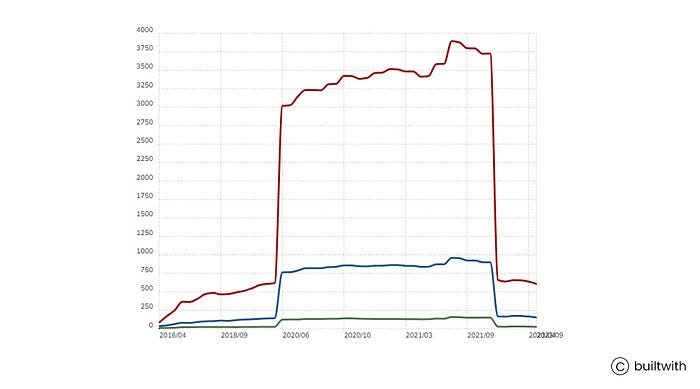
- Secure: In this day and age, tech professionals are very concerned about cybersecurity. Fortunately, Django’s security mechanism can guard against attacks like clickjacking, cross-site scripting, and SQL injection and promptly provides updated security fixes.
- Scalable: It is yet another benefit of utilizing Django to create web applications. Development can be scaled up or down, changing the number and complexity of Django components as necessary, depending on your particular product requirements.Django helps to maximize scalability and save web hosting costs by handling traffic and mobile app API usage from over 400 million users.
- Good Documentation & Tutorials: Django has good documentation and tutorials available. The quality of the official Django documentation is quite good. The framework has excellent community support, and many developers are available to assist newbies.
- Rapid Development: Django allows developers to develop applications as quickly as possible. We can work on many components simultaneously and integrate them much more effectively thanks to Django’s MVT framework. Additionally, Python code is straightforward to write and doesn’t require a lot of rules.
- Versatile: Django is capable of handling everything; from controlling scientific computing platforms to managing content management systems. Everything falls under the umbrella of Django.
- Object Relational Mapper: Django ORM feature makes the developer’s work easy. As a developer, you only require basic knowledge of SQL. Also, record database management is made simple using ORM.
- Fully Loaded: Django offers a wide range of features, including user authentication, sitemaps, content management, RSS feeds, robust design, rapid software development, and many more.
- Free Flow Coding: Unlike other frameworks, Django doesn’t import any packages. There are no imports or third-party libraries required because it is a complete package. Therefore, developers avoid application bugs before it goes live in the production environment because it doesn’t allow incorrect code or unwanted functions by default.
- Admin Interface: With Django’s admin interface you can regulate access for other users and manage your databases. Without the need for commands, a graphical user interface can carry out the necessary CRUD (Create, Read, Update, Delete) operations.
- Batteries: Django adopts a “batteries included” approach. For daily tasks and requirements like security, database manipulation, session management, HTML templating, URL routing, and more, it offers predefined codes. As a result, the overall amount of time needed for web development is drastically reduced.
Ruby on Rails (or Rails) is a free and open-source web app development framework written in Ruby programming language. It was first released in August 2004.
Technically speaking, it is described as a RubyGem package library that is installed through the operating system’s command line interface. The framework offers developers a quicker way to write code. It is a group of code libraries that provide a ready-made solution for regular chores like creating tables, forms, or menus for the website.
It uses Ruby as well as JavaScript, HTML, and CSS to create web applications that run on a web server. Ruby on Rails is a back-end or server-side web application development platform since it operates on a web server.
Ruby on Rails is comparable to Python on Django or PHP on Laravel and Symfony. Underneath the language’s elegance and brevity, developers find that Ruby on Rails has a lot to offer. It is intended to assist agile development and give development teams productivity and flexibility. Additionally, it stands as the most popular backend technology for WEB3 development.
Some of the few famous companies using Laravel:
- Bloomberg
- Dribble
- Fiverr
- Couchsurfing
According to Github, Ruby on Rails has 53.9k stars and companies of all sizes, from small to large, are incorporating it into their stacks due to its growing popularity.
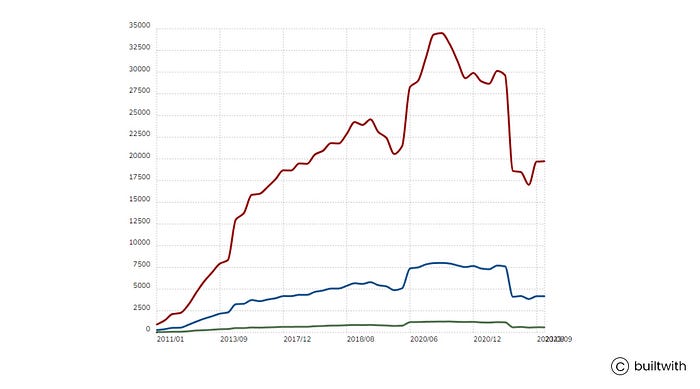
- Code Quality: When compared to PHP or NodeJS, Ruby code from third parties is much superior in quality.
- Automated Testing: Ruby community is active in testing and test automation. This is incredibly valuable for delivering good quality software and is one of the reasons Ruby libraries are so good.
- Performance: High-performance applications can be created with Ruby on Rails software development. Developers can create apps that mimic the common architecture of the best applications in the market by adhering to the convention over configuration and don’t repeat principles.
- Large Community: On GitHub, Ruby on Rails programmers have one of the biggest communities and one of the biggest repositories. The Ruby on Rails community provides both theoretical and practical knowledge. There is sufficient documentation available for new developers to comprehend the Ruby on Rails development framework’s overall architecture.
- Cost Effective: One of the most commonly faced problems for startups is time and budget. Ruby on Rail is cost-effective as it is completely free and open-source. From the perspective of a developer, it is also simple to use. Since there are so many gems (plugins) available, ruby has the advantage of saving developers a tonne of time and effort.
- MVC Architecture: Model, View, and Controller is the widely used web application architecture on which Ruby on Rails is based. Therefore, Ruby on Rails can be used easily by developers who are familiar with working with other frameworks that employ MVC principles. With this architecture, the presentation layer, data layer, and resource layer maintenance codes are separated.
- Active Record: Ruby on Rails relies on a powerful library called active record which makes it simple for developers to design the database interaction queries. This is because they create the query in the Ruby programming language, which is then automatically translated into a SQL query that accepts the result and returns an object. It is quite rare to create a SQL query because the active record library can handle the majority of the work.
- Simple Testing Tool: Ruby on Rails comes with a unit testing setup called RSpec. You can use it to test the functions used in the application by calling each one separately because it is just ordinary Ruby. You can use it to make sure your application has undergone sufficient testing.
- Convention Over Configuration: To keep conventions, reflection, and dynamic runtime extensions, Ruby on Rails does not use configuration files. The “Convention over Configuration” philosophy advocates automatically assigning value without user input. The convention feature boosts productivity because it eliminates the need for a lengthy configuration file setup.
The public release of Laravel was in the year 2011 and since then it is one of the most popular PHP frameworks. There are around 1,14,640+ active Laravel websites. Laravel is a web development framework that is simple and elegant, because of its clean and comprehensive syntax, which combines Model-view-controller architecture to develop web applications.
Laravel, for example, gives us a syntax that is both expressive and elegant. Laravel turns development into a fun, creative, and enjoyable process. Laravel is a useful framework that makes basic operations like routing, authentication, sessions, and caching much easier. It’s not only accessible, but it also comes with a set of strong tools for building large, stable applications.
A flawless simple syntax that can be used to create high-performing web applications implies that Laravel in 2022 and the coming years is promising.
Some of the few famous companies using Laravel:
- MasterCard
- Razorpay
- Kmong
- Bitpanda
According to Github, Laravel has 75.4k stars and companies of all sizes, from small to large, are incorporating it into their stacks due to its growing popularity.
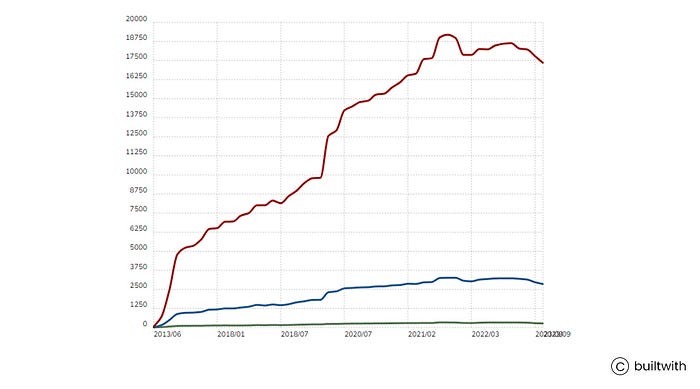
- Flawless User Authentication and Authorization: One of the key Laravel benefits is its plug-and-play authentication methods, which enable users to safely access your resources through a lightning-fast, intuitive, elegant, and simple interface.
- Quick Caching Integration: Laravel quick or fast caching integration gives a stunning user experience on your website. Laravel supports in-demand backend caching like Memcached and Redis out of the box.
- Safe and Secure Transactions: When a business develops a website, then security is the prime concern and Laravel is best because of its built-in systems that protect against SQL injection, core site scripting, and more. Its codebase is frequently used, and as a result, it is well-protected.
- Open-source and Strong Community: Laravel is open-source and has a strong community that constantly supports developers and companies. As a result of the strong support you receive, your development work doesn’t stop.
- MVC Architecture: Because of MVC architecture that provides built-in functionalities, Laravel is the foremost framework to use for your web app development.
- Artisan Console: It is one of the best features of Laravel. Artisan, a built-in command-line tool in the Laravel framework, helps automate the majority of tedious repetitive programming processes.
- Libraries and Modularity: With its Object-oriented framework, Laravel is one of the best packages available. Several pre-installed libraries fully support modularity.
- Eloquent ORM: Eloquent Object Relational Mapping (ORM) is a Laravel feature that contains a simple PHP Active Record implementation. Instead of writing SQL code, web app developers can use PHP syntax to write database queries. In comparison to other PHP frameworks, ORMs are considerably faster.
- Unit- Testing: The Laravel framework can perform a large number of tests to ensure that the programmers’ new changes do not break anything in the web app unexpectedly.
- Template Engine: The Laravel framework is well-known for its lightweight templates, which can be used to build stunning layouts with dynamic content seeding.
In 2002, Microsoft introduced ASP.NET as a software framework. It is abbreviated as dot net and includes several coding languages, libraries, and editors. The ASP.NET framework allows you to create a wide range of applications like web apps, mobile applications, gaming, the cloud, the Internet of Things (IoT), etc.
ASP.NET software development framework and ecosystem allow quick development of desktop and web applications. It’s a popular free platform that’s now being used for a variety of applications because it provides the programming environment for the majority of software development phases. Businesses that want a wide range of functionality, such as web-based services, desktop software, and cloud infrastructure support, should use ASP.NET.
In the current era of website development, most famous companies are using the ASP.NET framework for developing web apps.
Some of the few famous companies using ASP.NET
- Accenture
- Stack Overflow
- Starbucks
- GoDaddy
- Microsoft
According to Github ASP.NET has 19.5k stars and companies of all sizes, from small to large, are incorporating it into their stacks due to its growing popularity.
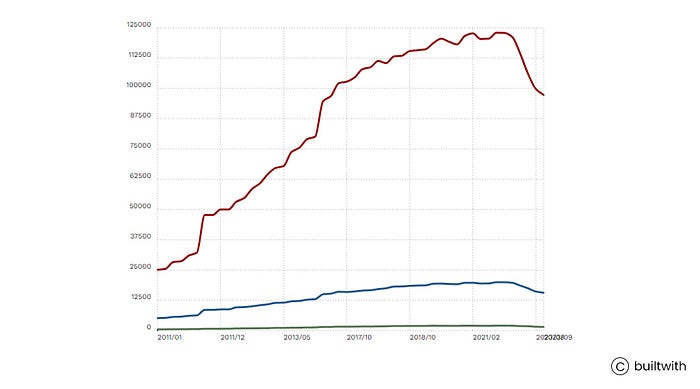
- Requires less Code: An object-oriented programming that eliminates excess code and allows developers to write fewer lines of code. There is a lot of reusable code in ASP.NET, as well as a lot of reusable elements. This leads to less time spent and lower costs in developing apps.
- Object-Oriented: In the ASP.NET framework, everything you see is an object. As a result, you’ll have a powerful tool for not only accessing but also controlling your apps. This also makes responding to recurring events much easier.
- Caching: The caching system included in ASP.NET is incredibly reliable and simple to use.
- Easy Maintenance: With ASP.NET, creating and maintaining pages is easy. This is because the source code and HTML both are together.
- Saves Time: ASP.NET saves a lot of time as it removes a larger part of coding requirements. This means companies save time and apps’ time to market is shortened.
- Large Community: ASP.NET has a large community. Most companies and developers use the ASP.NET framework because of the high-level support from the community. With a large community, almost any problem may be solved with the help of other members.

Reasons to Hire a Dedicated .Net Development Team and Make it Work
Explore
- Common Language Runtime: This is the engine that is shared by all .NET languages, including C#, VB.NET, Managed C++, J#, and coming languages.
- Tool Support: To make the developer’s job easier, the CLR works in combination with tools like Visual Studio, compilers, debuggers, and profilers.
- Easy Debugging Support: The.NET IDE (integrated development environment) offers comprehensive debugging capabilities. When a run-time exception occurs, the program terminates, and the IDE highlights the line containing the error, as well as the specifics of the error and alternative solutions.
- Multi-Language Support: ASP.NET supports multi-language development by managing the compilers that convert source code to intermediate language (IL) and IL to native code, as well as ensuring program safety and security.
- Security: The CLR ensures system security by identifying users and code, as well as performing permission checks. The code’s identity can be determined, and authorization to access resources is granted accordingly. This level of security is a key feature of the.NET framework.
Codeigniter is a PHP framework released on February 28, 2006, by EllisLab. It was created for web developers who want a simple and attractive toolset for building fully functional web apps. CodeIgniter is one of the most popular frameworks for building dynamic websites with PHP.
Codeigniter provides companies with well-organized documentation. It provides exceptional support and stability. It allows for a simple routing approach to be used. It also directs you to the cached website, which improves performance and loading time.
The framework provides complete freedom to the users, removing the need for them to rely on the MVC development paradigm. The best thing about CodeIgniter is that it allows third-party plugins to help with complex functionality implementation.
Some of the few famous companies using Codeigniter
- Ola
- Accenture
- Buffer
- SocialDog
- Saramin
According to Github Codeigniter has 18.2k stars and companies of all sizes, from small to large, are incorporating it into their stacks due to its growing popularity.
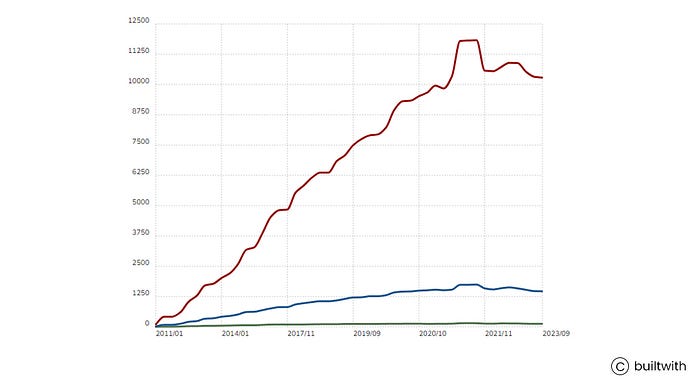
- Error Handling: A simple user interface is offered by Codeigniter to detect any errors or defects that may be hindering the website’s smooth operation and, as a result, harming the user experience.
- Hassle-free Migration: Codeigniter provides adequate migration support. CodeIgniter allows developers to migrate from one server to another when it comes to database updates and migration.
- Good Community Support: When it comes to advanced development services, a large number of skilled professionals are available to provide you with the finest-in-class support.
- Fast Development: The Codeigniter framework is best for fast development as it requires less code to develop a website.
- Simple and Easy to Use: The Codeigniter framework is simple and easy to use because of its easy interface. With Codeigniter, it is also easy to modify databases in different ways.
- Lightweight: Codeigniter’s fundamental system requires a relatively modest library. Other libraries can be added dynamically based on requirements. Because of this, the framework is quick and lightweight.
- Search Engine Friendly URLs: The multiple URLs that Codeigniter generates are clean and search engine friendly. Instead of using a normal query-based approach, it uses a segmented approach.
- Model-View-Controller: MVC provides a Test Driven Development, which implies that the developer may build and test modules precisely according to the requirements.
- Built-in Libraries: The framework provides built-in libraries that assist in doing all the tasks like email sending, manipulating images, HTML/text emails, etc.
- Data Transfer is Easy: With the Codeigniter framework transfer of data is easy without any loss of relevant data.
Flask, crafted by Armin Ronacher of Pocoo, a global community of Python enthusiasts established in 2004, originated as an April Fool’s joke that gained such popularity that it evolved into a genuine and significant application, as envisioned by Ronacher.
It falls under the category of microframework since it doesn’t necessitate specific tools or libraries.
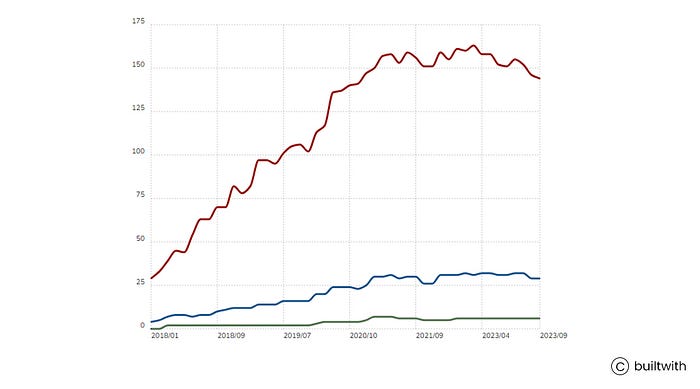
Some of the few famous companies using Flask
- Samsung
- Netflix
- Zalando
- Airbnb
- Trivago
- Flask boasts an active community, continuously enhancing the framework.
- It maintains a lightweight design with built-in modules.
- Enables quick and easy application development.
- User-friendly interface makes it ideal for beginners.
- Advanced users can extend features through Flask’s extensions.
- Development Server and Debugger: Flask includes a built-in development server and debugger.
- Integrated Unit Testing: It provides integrated support for unit testing.
- RESTful Request Dispatching: Flask supports RESTful request dispatching for efficient web service development.
- Jinja Templating: Utilizes Jinja templating for flexible and dynamic content rendering.
- Secure Cookies (Client-Side Sessions): Ensures security with support for secure cookies on the client side.
- WSGI 1.0 Compliant: Flask is 100% WSGI 1.0 compliant for seamless integration with web servers.
- Unicode-Based: Built on Unicode for handling diverse character sets.
- Complete Documentation: Offers comprehensive documentation for easy understanding and implementation.
- Google App Engine Compatibility: Flask is compatible with Google App Engine for versatile deployment options.
- Extendable Functionality: Extensions are available to easily extend the framework’s functionality.
According to Builtwith, below is the graph of Flash Usage Statistics.
ExpressJS, first released on May 22, 2010, is now on Version 0.12. StrongLoop managed it after its acquisition in June 2014. IBM took over StrongLoop in September 2015, and in January 2016, ExpressJS came under the NodeJS Foundation incubator.
It is a minimal framework that is easy to learn and widely used. With its robust features, it enables the swift creation of diverse web and mobile applications.
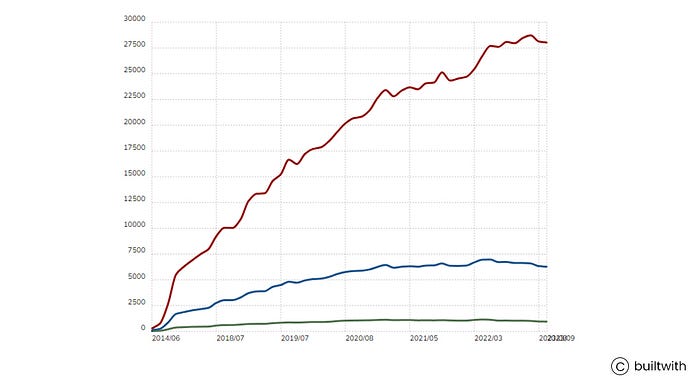
Some of the few famous companies using Express.js
- Countly
- Klout
- Storify
- MySpace
- LearnBoost
- Geeklist
- Rapid Application Scaling: ExpressJS excels in swiftly scaling applications, leveraging additional support from Node, which further accelerates the scaling process.
- JavaScript Advantages: With both ExpressJS and NodeJS based on JavaScript, even non-technical individuals find it easy to learn. The popularity of JS simplifies backend development.
- Google’s V8 Engine Support: ExpressJS benefits from Google’s V8 Engine support, enhancing server-side development in web applications for improved performance and seamless processing.
- Community Backing: Express.js boasts a vibrant developer community actively contributing to its enhancement. Developers can tap into a diverse range of resources, tools, and frameworks.
- Speedy Development: ExpressJS facilitates quick, responsive, and sophisticated web application development by offering pre-made libraries, functions, and tools that expedite the process.
- Swift Server-Side Development: ExpressJS streamlines NodeJS features, easily accessible as functions for developers. This approach minimizes coding time, enhancing productivity.
- Middleware: Middleware in ExpressJS systematically organizes functions, granting access to client requests, databases, and other middleware.
- Integration: ExpressJS seamlessly integrates popular databases like MongoDB, MySQL, and PostgreSQL. Middleware or plugins facilitate CRUD tasks and database management.
- Advanced Routing: ExpressJS boasts an advanced routing mechanism, preserving web page state through URLs more effectively than other frameworks.
- Templating: The ExpressJS templating engine empowers backend developers to craft dynamic content on web pages using HTML templates.
- Security: Express.js prioritizes security with features like HTTPS support, CSRF prevention, and XSS protection, ensuring the creation of secure web apps.
- Debugging: ExpressJS offers accessible and advanced debugging tools, crucial for pinpointing specific components with bugs during web application development.
According to Builtwith, below is the graph of Express.js Usage Statistics
Detailed blog here on our channel partner site:
Now, you are well-versed with the best backend frameworks we have listed above. Choose the framework that best suits your project. Hence, in the coming years, you will benefit yourself and will ease your development process with the above best backend frameworks.
If you are one of those who is looking for the best website development consultant then no need to worry, hire expert web developers at Ace Infoway. We at Ace Infoway with 20+ years of experience will assist you in backend development projects.
In case you have found a mistake in the text, please send a message to the author by selecting the mistake and pressing Ctrl-Enter.






